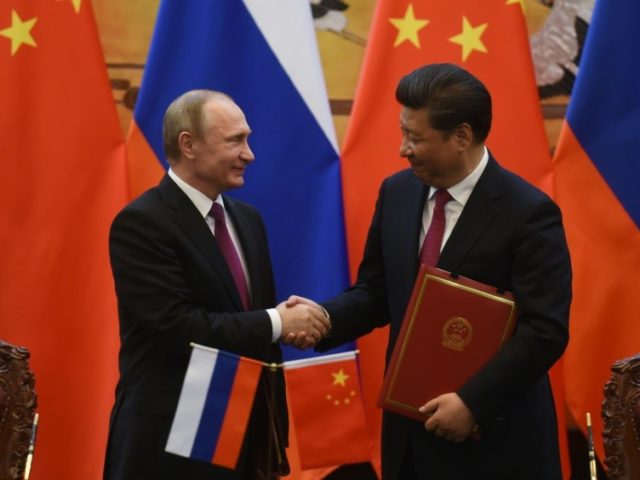The U.S. government is working on a new report, mandated by legislation signed into law before President Donald Trump took office, to evaluate whether the Russian and Chinese leadership have the capacity to survive a nuclear strike.
U.S. intelligence agencies and the Pentagon’s Strategic Command are putting together the study, reports Bloomberg, noting that the effort garnered “bipartisan support from members who harbor deep concern about China’s increasing military boldness and distrust of Russian President Vladimir Putin’s intentions.”
The evaluation is mandated by the 2017 National Defense Authorization Act (NDAA), signed into law by former President Barack Obama.
Michael Turner (R-Ohio), a member of the House Armed Service Subcommittee for Strategic Forces, sponsored the provision.
The U.S. “must understand how China and Russia intend to fight a war and how their leadership will command and control a potential conflict. This knowledge is pivotal to our ability to deter the threat,” Rep. Turner told Bloomberg.
He added that the two nuclear powers “have invested considerable effort and resources into understanding how we fight, including how to interfere with our leadership’s communication capabilities. We must not ignore gaps in our understanding of key adversary capabilities.”
The NDAA directs the Office of the Director of National Intelligence (ODNI) and U.S. Strategic Command, charged with planning and executing nuclear strikes, to evaluate the post-attack capabilities of China and Russia.
Furthermore, the law orders the U.S. intelligence community and the Pentagon to compile “a report on the leadership survivability, command and control, and continuity of government programs and activities with respect to the People’s Republic of China and the Russian Federation, respectively.”
Among various other requirements, the review is expected to include:
An assessment of the size and scope of such activities, including the location and description of above-ground and underground facilities important to the political and military leadership survivability, command and control, and continuity of government programs and activities of each respective country…An identification of which facilities various senior political and military leaders of each respective country are expected to operate out of during crisis and wartime[…]An identification of key officials and organizations of each respective country involved in managing and operating such facilities, programs, and activities, including the command structure for each organization involved in such programs and activities.
Moreover, the U.S. Strategic Command is mandated to “provide a detailed description for how the leadership survivability, command and control, and continuity of government programs and activities” China and Russia “are considered” in America’s own nuclear war plans.
A Strategic Command spokesman indicated to Bloomberg the military is working on the evaluation.
“Our experts are drafting an appropriate response,” revealed Navy Capt. Brook DeWalt, the spokesman. While “it’s premature to pass along any details at this point, we can update you further at a later date.”
The new commander-in-chief has expressed a willingness to strengthen America’s nuclear capabilities.
The United States must greatly strengthen and expand its nuclear capability until such time as the world comes to its senses regarding nukes
— Donald J. Trump (@realDonaldTrump) December 22, 2016
“The United States must greatly strengthen and expand its nuclear capability until such time as the world comes to its senses regarding nukes,” President Trump wrote on Twitter last month.
In a memo issued Friday, the president ordered U.S. Secretary of Defense James Mattis to “initiate a new Nuclear Posture Review to ensure that the United States nuclear deterrent is modern, robust, flexible, resilient, ready, and appropriately tailored to deter 21st-century threats and reassure our allies.”
Obama has already approved a “modernization of the air-sea-land triad over 30 years starting in the mid-2020s when operations and support are included,” notes Bloomberg.

COMMENTS
Please let us know if you're having issues with commenting.